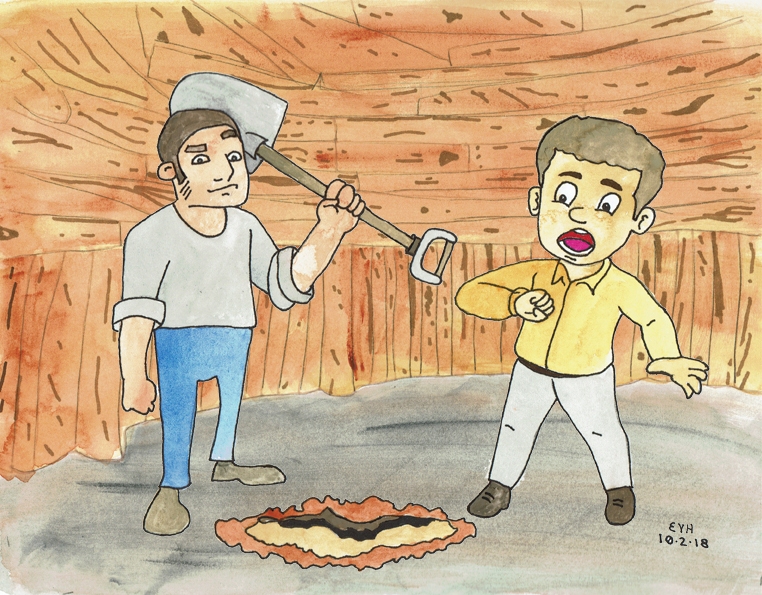
Jataka 89
Kuhaka Jātaka
The Deceiver
as told by Eric Van Horn
originally translated by Robert Chalmers, B.A., of Oriel College, Oxford University
originally edited by Professor Edward Byles Cowell, Cambridge University
This story is about a member of the Ājīvika sect of wandering ascetics. The Ājīvikas continued to exist until about the 14th century BCE. None of their texts survive, so the only accounts of their beliefs come from the Buddhists and the Jains (another sect of wandering ascetics who still exist). Because the Buddhists and the Jains were competitors of the Ājīvikas, scholars are skeptical about these accounts of their doctrines. Nonetheless, it appears that the Ājīvikas did not believe in free will, but that everything is pre-ordained.
And in the true spirit of propoganda, of course, the Ājīvika is the bad guy in this story (!).
“How predictable.” This story was told by the Master while at Jetavana. It is about a deceitful man. The details of his deceit will be related in the Uddāla Jātaka (Jātaka 487).
(Jātaka 487 does not really give a lot of details about the “man in the present” other than to say that he was a monk who – despite having ordained – used deceit and manipulation for material gain.)
Once upon a time when Brahmadatta was reigning in Benares, a shifty rascal of an ascetic lived near by a certain little village. He was the type of ascetic that wears long, matted hair. (A “matted hair ascetic” is another name for an Ājīvika.) The landowner of the village built a hermitage in the forest for him to live in, and he used to provide excellent food for him in his own house. Taking the matted-haired rascal to be a model of goodness, and living as he did in fear of robbers, the squire brought a hundred pieces of gold to the hermitage and buried them there. He asked the ascetic to watch over them.
“There is no need to say that, sir, to a man who has renounced the world. We recluses never crave other peoples’ possessions.”
“Very well, sir,” the man said, and he went off with full confidence in the ascetic’s assurances. Then the rascally ascetic thought to himself, “there is enough here to keep a man secure and comfortable for his entire life.” After letting a few days go by, he removed the gold and buried it by the side of a road. After that he went back to live just as he had before in his hermitage.
On the next day, after a meal of rice at the landowner’s house, the ascetic said, “You have supported me for a long time, sir. And to live in one place for very long is like living in the world. This is forbidden to avowed ascetics. Therefore, I must leave.” And even though the landowner tried to convince him to stay, nothing could overcome this determination.
“Well, then, if it must be so, go your way, sir,” the landowner said, and he escorted the ascetic to the outskirts of the village to see him off. After walking a short way, the ascetic thought that it would be a good thing to further deceive the landowner. So he put a straw in his matted hair and turned back again.
“What brings you back?” asked the landowner.
“A straw from your roof, sir, had stuck in my hair. And, as we ascetics may not take anything which is not given to us, I have brought it back to you.”
“Throw it down, sir, and go your way,” the landowner said. And he thought, to himself, “Why, he won’t take so much as a straw which does not belong to him! What a sensitive nature!” Highly delighted with the ascetic, the landowner bade him farewell.
Now at that time it so happened that the Bodhisatta, who was on his way to a border town for trading purposes, had stopped for the night at that village. Hearing what the ascetic said, he was immediately suspicious that the rascally ascetic must have robbed the squire of something. So he asked the landowner whether he had left anything in the ascetic’s care.
“Yes, a hundred pieces of gold.”
“Well, just go and see if it is safe.”
The landowner went back to the hermitage and looked, and he found that his money was gone. Running back to the Bodhisatta, he cried, “It’s not there!”

Figure: The Money Is Gone!
“The thief is none other than that long-haired rascal of an ascetic,” the Bodhisatta said. “let us go after him and catch him.”
So away they ran in hot pursuit. When they caught the rascal they tied him up and kicked him until he told them where he had hidden the money. When he retrieved the gold, the Bodhisatta looked at it and scornfully remarked to the ascetic, “So a hundred pieces of gold didn’t bother your conscience as much as that straw!” And he rebuked him in this stanza:
How plausible the story that the rascal told!
How heedful of the straw! How heedless of the gold!
When the Bodhisatta had rebuked the fellow in this way he added, “And now take care, you sanctimonious liar, that you don’t play such a trick again.” When his life ended, the Bodhisatta passed away to fare according to his karma.
His lesson ended, the Master said, “So you see, brothers, that this monk was as deceitful in the past as he is today.” And he identified the birth by saying, “This deceitful monk was the deceiful ascetic of those days, and I was the honest and good man.”
